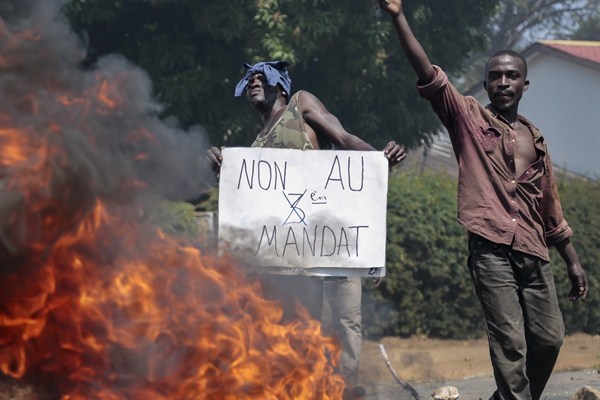On Tuesday, a prominent human rights activist and critic of Burundian President Pierre Nkurunziza was shot and seriously injured by gunmen on motorbikes in the capital, Bujumbura. The attack comes days after a powerful general and close ally of Nkurunziza was shot and killed Sunday. These are just the latest events in what has been a tense and often violent several months following Nkurunziza’s decision to seek a third term in April. Many in Burundi deemed that move unconstitutional, and breakaway members of the military attempted a failed coup in May.
As many observers predicted, Nkurunziza’s decision to seek a third term sparked immediate violence in Burundi. In early May, after the country’s Constitutional Court ruled that Nkurunziza’s bid for a third term was legal, on the grounds that he was first elected in 2005 by the National Assembly and not by popular vote, Jonathan W. Rosen reported violence already on the rise. “Since April 26, the day following Nkurunziza’s nomination, at least 13 people have died and as many as 600 have been arrested in protests against a possible third term, which continue on a daily basis in Bujumbura,” he wrote.
In July, ahead of the controversial presidential elections, fighting broke out between an unidentified armed group and the army in the north of Burundi, near the Rwandan border. This new militant group has raised many questions, as Nina Wilén wrote last month.
Keep reading for free!
Get instant access to the rest of this article by submitting your email address below. You'll also get access to three articles of your choice each month and our free newsletter:
Or, Subscribe now to get full access.
Already a subscriber? Log in here .
What you’ll get with an All-Access subscription to World Politics Review:
A WPR subscription is like no other resource — it’s like having a personal curator and expert analyst of global affairs news. Subscribe now, and you’ll get:
- Immediate and instant access to the full searchable library of tens of thousands of articles.
- Daily articles with original analysis, written by leading topic experts, delivered to you every weekday.
- Regular in-depth articles with deep dives into important issues and countries.
- The Daily Review email, with our take on the day’s most important news, the latest WPR analysis, what’s on our radar, and more.
- The Weekly Review email, with quick summaries of the week’s most important coverage, and what’s to come.
- Completely ad-free reading.
And all of this is available to you when you subscribe today.

